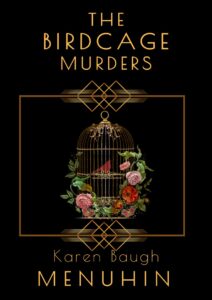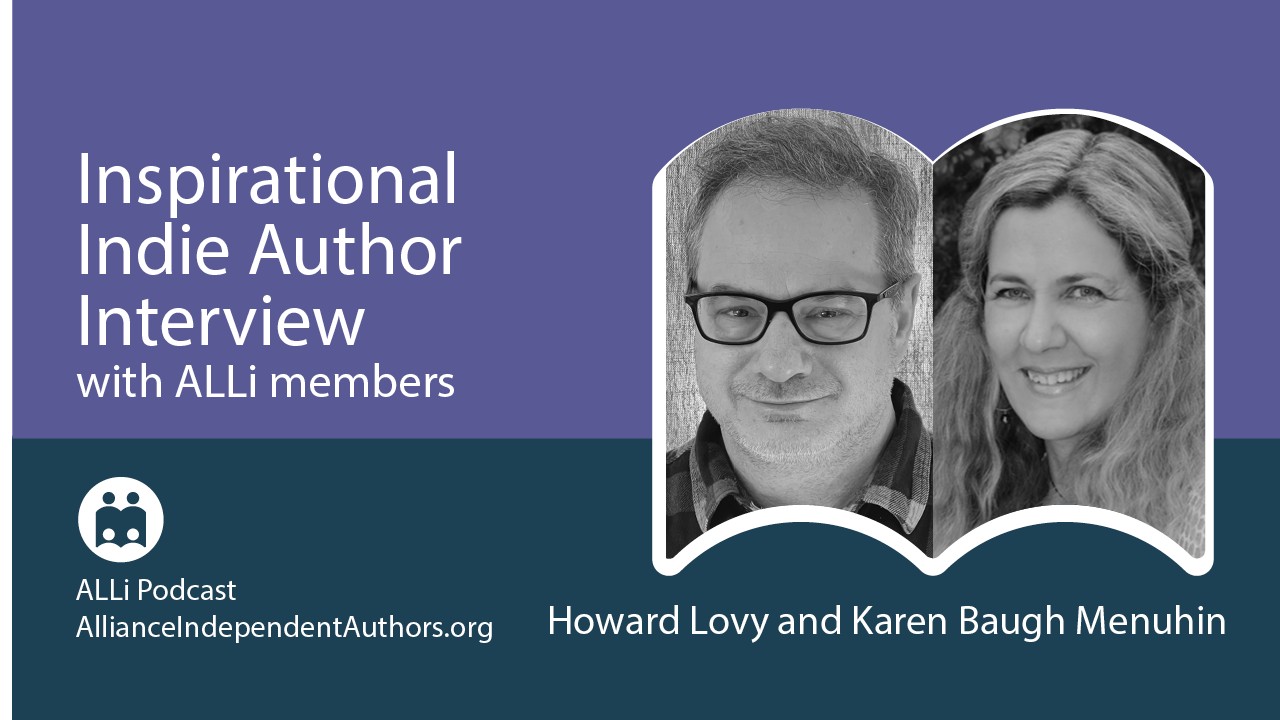My ALLi author guest this episode is Karen Baugh Menuhin, who began self-publishing at the age of sixty, when she discovered that her lifelong habit of daydreaming could be turned into compelling characters and plots in a series of cozy mysteries. And her fans agree. She's sold over 100,000 audiobooks and around 350,000 ebooks.
 ALLi's Inspirational Indie Author Podcast stream is sponsored by Kobo Writing Life, a global, independent ebook and audiobook publishing platform that empowers authors with a quick and easy publishing process and unique promotional opportunities. To reach a wide readership, create your account today! Thank you, Kobo, for your support of this podcast.
ALLi's Inspirational Indie Author Podcast stream is sponsored by Kobo Writing Life, a global, independent ebook and audiobook publishing platform that empowers authors with a quick and easy publishing process and unique promotional opportunities. To reach a wide readership, create your account today! Thank you, Kobo, for your support of this podcast.
Find more author advice, tips, and tools at our Self-Publishing Author Advice Center, with a huge archive of 2,000+ blog posts, and a handy search box to find key info on the topic you need.
We invite you to join our organization and become a self-publishing ally, if you haven’t already. You can do that at allianceindependentauthors.org.
Inspirational Indie Author Interview: Karen Baugh Menuhin
On the Inspirational Indie Authors Podcast, @howard_lovy features Karen Baugh Menuhin, who began self-publishing at the age of 60, when she discovered that her daydreams could be turned into compelling cozy mysteries. Share on XDon't Miss an #AskALLi Broadcast
Subscribe to our Ask ALLi podcast on iTunes, Stitcher, Player.FM, Overcast, Pocket Casts, Spotify or via our RSS feed:
Inspirational Indie Author Interview: Karen Baugh Menuhin. About the Author
 Karen Baugh Menuhin has lived an itinerant life, always on the move having grown up in the military. Her two sons are Jonathan and Sam Baugh, who is married to Wendy. Grandchildren are Scarlett, Hugo, Charlie, Joshua and Isabella Rose. At age 60, she decided to write. She doesn't know why, but suddenly the stories came pouring out, along with the characters. A whole world built itself upon the page and she just followed along. Eccentric uncles, stalwart butlers, idiosyncratic servants, machinating Countesses, Mr Fogg the dog, Tubbs the cat, and the hapless Major Heathcliff Lennox at the center of it all. Her husband is Krov Menuhin, ex-US Special Forces, and documentary filmmaker. He is the eldest son of the violinist, Yehudi Menuhin.
Karen Baugh Menuhin has lived an itinerant life, always on the move having grown up in the military. Her two sons are Jonathan and Sam Baugh, who is married to Wendy. Grandchildren are Scarlett, Hugo, Charlie, Joshua and Isabella Rose. At age 60, she decided to write. She doesn't know why, but suddenly the stories came pouring out, along with the characters. A whole world built itself upon the page and she just followed along. Eccentric uncles, stalwart butlers, idiosyncratic servants, machinating Countesses, Mr Fogg the dog, Tubbs the cat, and the hapless Major Heathcliff Lennox at the center of it all. Her husband is Krov Menuhin, ex-US Special Forces, and documentary filmmaker. He is the eldest son of the violinist, Yehudi Menuhin.
About the Host
Howard Lovy has been a journalist for more than 35 years, and now amplifies the voices of independent author-publishers and works with authors as a developmental editor. Find Howard at howardlovy.com, LinkedIn and Twitter.
If you’re a published indie author who would like to be interviewed by Howard for the Inspirational Indie Authors podcast, you need to be a member of the Alliance of Independent Authors.
Then contact Howard, including your membership number, explaining why you’re an inspirational indie author and what inspires you.
If you haven’t already, we invite you to join our organization.
Read the Transcripts — Inspirational Indie Author Interview: Karen Baugh Menuhin
Howard Lovy: My guest this episode is Karen Baugh Menuhin, who began self-publishing at the age of 60 when she discovered that her lifelong habit of daydreaming could be turned into compelling characters and plots in a series of cosy mysteries. And her fans agree, she's sold over 100,000 audiobooks and around 350,000 eBooks.
I'll let Karen Baugh Menuhin tell her story.
Karen Baugh Menuhin: I'm Karen Baugh Menuhin. I'm the author of the Heathcliff Lennox series, which is a murder mystery set in the 1920s. I live in England. I'm very fond of England, and so this is where the books are set, mostly in the Cotswolds where I live.
They've done quite well, and people seem to like them. I think they're particularly like the dog and the cat, but yeah, they've proved popular. I've sold many books, probably getting on for a million now, I think, which is quite remarkable. Number one in Amazon USA, and I'm on my 10th book, which I'm still enjoying.
I'm thoroughly enjoying writing. I didn't start until I was 60, which is peculiar, and I have to say, I would've always loved to write, but never believed I could. I think it's only when I discovered self-publishing that I figured this is a route, instead of the process of approaching publishers and being turned down, and basically feeling like you just want to crawl away into a hole somewhere by the time you've gone through the process, you just think, let's get it directly to the readers and they can decide. And that worked, and it connected me directly to the readers, and that allowed me to bring my work to them.
Howard Lovy: Karen moved around a great deal as a child, but books were her constant companion.
Karen Baugh Menuhin: As soon as I could, I was reading. I recall, my father was in the RAF, so we moved around all the time, and books were a constant companion for me, probably one of the rare constants in my life actually. I even recall, my first school was in Scotland as a very small child. I think we were three or four when you started at school there, and the first thing I remember looking at is sitting on a rug in the sunshine, going through all the books. I think I was just surrounded. I'd got a lot of shelves and was just surrounded by a pile of books.
That was my earliest memory of school, and always when I came home from school, I either had a book with me because I would sneak off and read it between lessons, and as soon as I got home, it was the first thing I did was to curl up with my book and I would read every hour possible, and everything possible as well. Completely, anything that came my way, I would read. I'd got a number of favourite authors, but literally I would read anything and everything.
Howard Lovy: Karen went to university and became an accountant.
Karen Baugh Menuhin: Which is a peculiar combination, usually, author and accountant.
I think there's a process where it comes to murder mysteries that is not mechanical by any means, but there's a pattern to it, and I mean that is, I suppose, my talent is for pattern recognition, and numbers follow very strict patterns.
I don't follow formulaic plots by any means. In fact, I'm a complete pantser. I cannot write a plot from beginning to end, but there is a pattern to the storyline and I'm very much aware of that, and I think that probably that's where the combination of the two sites come into play.
Howard Lovy: But Karen's independent spirit could not be contained in an office.
Karen Baugh Menuhin: I worked for about five years in the defense industry, cost accountant, and then I just, I'm a square peg in a round hole, I'm afraid, or the other way around.
I love teamwork, I love working together, but I equally like to do whatever it is that takes an interest. So, my late husband and I, this is my previous husband, we loved doing houses up and so we did that for a very long time. In fact, until he died in France. We'd moved to France by that time, and he died there, unfortunately. So, I was widowed for a while and then eventually married my current husband, my bast husband, if you like, Krov Menuhin, and so this is what I did. I haven't worked in an office or in a work environment for a very long time.
Howard Lovy: It wasn't until she reached 60 years old that Karen decided to begin writing books, and it began when her husband, Krov Menuhin, documentary filmmaker and eldest son of the violinist, Yehudi Menuhin, was commissioned to write his autobiography.
Karen Baugh Menuhin: Well, this was because my husband's publisher went broke. He'd been asked to, well, he'd been commissioned to write his autobiography. He was a wildlife filmmaker for all of his career, apart from when he was in the US Army in Special Forces, and they'd commissioned him to write his autobiography and then went broke. So, it was a question then of, okay, what do we do now, and I was determined to have him finish it because he really didn't want to.
So, I'd heard about this self-publishing, or I'd read about it I think in the newspaper, and I said, I know, we'll find out how this works, and I did eventually. It took quite some time, it wasn't particularly complex, it was just something very unfamiliar to us.
We eventually managed to get the file formats in order and do all the things that you've got to do, and we managed to get it onto Amazon.
Having learned that, I just missed the process when we'd finish his book, I didn't write it at all, I just helped put it together, but I missed that written word and I suddenly realized that I'd always loved to write as a child. Then of course, real life gets in the way, and you have to make a living, and I just thought, why don't I have a go? I think most of us think this way actually. Why not?
So, I had these ideas buzzing around in my head. I've never been short of ideas, I'm definitely always one of these people looking out the window dreaming of something else, and I decided, well, obviously I love murder mysteries. I mean, Agatha Christie and Midsummer Murders, you name it, I've watched it or read it. So, that was naturally the one I would go for.
Howard Lovy: For Karen, the plots to her books come out of the process of writing. Characters take on lives of their own.
Karen Baugh Menuhin: I am literally a dreamer, so it's probably why I don't fit in terribly well to the office scenario. So, it's just, all these ideas come out and as I said, I'm a pantser, not a plotter. So, I will just sit and start writing, and the characters just literally come, but I think you have to follow them along. Yeah, the number of times I've rewritten a book or at least half of it, because I just realized that okay, they had rather taken over it, and definitely not gone in the right direction, but that's the creative process, isn't it?
Howard Lovy: And it turned out readers appreciated her work too; sales on Amazon skyrocketed.
Karen Baugh Menuhin: The sales went through for about three months extremely well. I was amazed. Lots of very positive reviews, and then in February, the sales started to drop away, and I thought, I guess I have to learn something about advertising and marketing. So, I went, and I talked about Jericho, I was a member of Jericho writers’ group, and they were doing a lecture on marketing with David Gaughran and Harry Bingham.
So I thought, right, I think I'd better go and listen to this. So, I went for a one-day lecture in London and listened to them, and they told me, they explained to everybody in the class, this is what you should be doing, and it was straightforward stuff.
You needed to understand Facebook, well, it sounds simple, but it certainly isn't. But I thought, I better learn how to do that, and Amazon itself, how to advertise on Amazon.
So, they just gave the outlines and so I thought, fine, I think I'd better do this. And I did.
In the meantime, I carried on writing, and I think, I can't remember when I brought the second book out, April probably. And that really helps, obviously we bring a book out and that boosts the first one. But I did start learning about marketing and advertising and all the rest of it.
It is a very difficult thing, even despite my business mind, and I am hopefully capable of adding up numbers and doing these kinds of things, but it's very time consuming. Because suddenly, you've got two jobs. You are writing and you are trying, and we're all, all self-publishers, are quite aware of how complicated and difficult this is.
So, anyway I just persevered through the years. Eventually my son, my eldest son, Jonathan took on the job of marketing for me, and he still does, and he's been responsible for promoting the books far better than I could, and he devotes the time to it as well.
Howard Lovy: Despite the time it takes to market her books, Karen does not regret self-publishing.
Karen Baugh Menuhin: I have no idea if I would've been able to attract a publisher, and some of the stories that I hear, I'm a member of the Crime Writers Association, I went to the conference last year in Torquay, and I was hearing of people who were only having something like 10% of royalties, net royalties. I'm thinking, that's appalling, and I think one of my friends was one of the best, she was on 30%.
But I think, hang on, I get 70%, it seems a bit more reasonable to me. What do they do with for the rest?
And of course, they're put through the ringer by the publishers. So, I'm not saying there's anything wrong with publishers, there are a hell of a lot of very good publishers around. But I'm not sure that I'm the kind that would be able to work well with the demands. So anyway, it suits me.
Howard Lovy: What also suits Karen is the cosy mystery genre, and she doesn't see any reason to change a formula that works.
Karen Baugh Menuhin: Yes. That's what I absolutely adore. That's what works. People enjoy it. I've got a very good following, so I know when I bring a book out, that's what they're looking for. They're always waiting for it. And from that point of view, it works well. So, I don't see any reason to change that.
I am co-authoring a book at the moment with a young writer. We're about to bring it out actually. This is a different series, but it's something that I've been working on. She's such a good writer and I really wanted to be able to bring her on and work with her, Zoe Markham. So, we are bringing out a character from my second book into a series that's similar but not the same as the existing one I'm writing. So, that's quite exciting, that's a completely new venture for me.
Howard Lovy: Karen's advice for other self-publishing authors, make your books as polished as they can be, and that means get a professional editor.
Karen Baugh Menuhin: Major tip is to always get a damn good editor. It doesn't matter how good we think we might be in grammar and punctuation; you get so lost in the story that you really will forget. We self-publishers want to be as professional as anybody else. People are going to pay with their money and their time to buy our books and read them, and we want to give them the very best. So, absolutely an editor is the first thing.
If you can get an editor who will also pick up, not just your punctuation, but logic gaps. I think certainly in my type of genre, you cannot afford a logic gap or an error in the storyline because it can screw it up. So, somebody who will do that for you, act as a second, if you like, a second opinion or just a second pair of eyes is invaluable, and I always believe in professionals, professionalism.
I'm a team now, I've got a number of people who I use for doing all sorts of different jobs, just as a publisher would, and it's really nice. I love being able to cooperate with them and say, hey, what do you think of the design work on the front cover, arguments over the font, and stuff like this, and also discussing the book with my editor, and all sorts of things.
It's very important to get your team together and you will over time because you just have to, and then it becomes just another aspect to it. But it's a nice aspect because we spend a lot of time on our own as writers, locked in our own little heads.





